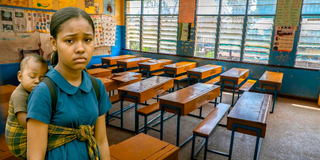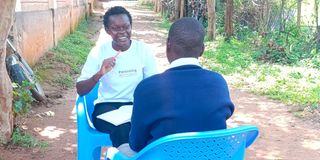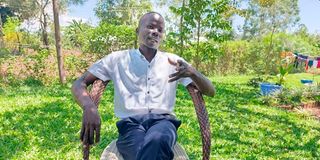Homework, housework, and motherhood: The triple burden of Kenya’s teen mothers

Defiled at 14, abandoned by family, and stigmatisd by society, Kenya's teen mothers face overwhelming barriers despite a decades-old school re-entry policy.
What you need to know:
- While classmates play after the bell rings, teenage mothers like Lucy hide in school latrines to express milk from painful breasts.
- Defiled at 14, abandoned by family, and stigmatised by society, Kenya's teen mums face overwhelming barriers despite a decades-old school re-entry policy.
- With teen pregnancy rates at 19.9 per cent and only two per cent of teen mothers completing their education, girls like Lucy and Achieng fight daily against a system that treats them as cautionary tales rather than students deserving support.
The 3:30pm school bell rings, signalling freedom. As students burst through classroom doors and flood the expansive fields, 16-year-old Lucy* slips away quietly, ducking into the latrine. Her mission is not the same as her peers'. With swollen, painful breasts filled with milk, she finds a private moment to express the discomfort away—a daily ritual that marks her distinct journey as both student and mother.
Relief comes, but only briefly. While classmates enjoy their games period, Lucy returns to her desk to complete homework, knowing that once school ends, her day is far from over.
At home, another set of responsibilities awaits: relieving the caregiver of her one-year-old son and tackling household chores.
At just 16, Lucy juggles three demanding roles—student, mother, and daughter—her young shoulders carrying responsibilities far beyond her years, all while clinging to the hope for brighter days.
Despite the overwhelming challenges, she expresses gratitude for the opportunity to be back in school after a two-year hiatus. The journey back to education wasn't easy, and at many points, seemed impossible.
"I became a mother in late 2023, my child is now one year, six months," says Lucy, who only resumed her education late last year.
The teenager had once dreamed of becoming a teacher, but those aspirations dimmed considerably with her unexpected pregnancy. What should have been a straightforward path through adolescence abruptly detoured into the complex terrain of premature parenthood.
Lucy was only 14 when she conceived during term two at a secondary school in Kisumu. Her mother, noticing symptoms similar to morning sickness, promptly took her for medical tests, where her fears were confirmed.
The family would later discover that Lucy had been defiled by a neighbour who threatened her into silence.
Her father's reaction was swift and unforgiving. To him, Lucy had brought shame to the family, and he vowed never to support her education again. Defying his decree, the teenager continued attending classes for several weeks, but the physical demands of pregnancy soon made this arrangement untenable.
During this period, she battled fatigue, swollen feet from sitting through long classes, and the persistent drowsiness that accompanied her condition. As her pregnancy progressed, the practical challenges mounted.
"With time, my belly also enlarged and my uniform was no longer fitting. I finally decided to pause my classes and wait for my child to be born," she recalls.
More crushing than the physical discomfort was the social isolation that followed. Peers branded her "not so well behaved," teachers used her as a cautionary tale, and parents in the neighbourhood explicitly warned their daughters against her company, fearing a similar "fall from grace."
"I decided to separate myself and would spend most of my free time all alone," Lucy recalls, adding that the stigma only intensified after childbirth.
Thrust into motherhood without guidance, she developed a detached relationship with her child.
"There was no one to offer training on motherhood," she explains, noting that her baby spent most of his time either sleeping or breastfeeding. She avoided interaction beyond feeding, unconsciously blaming the innocent child for her circumstances—a notion reinforced by the persistent stigma surrounding her.
Educational aspirations
After delivery, Lucy remained at home. When her baby turned six months old, she raised the possibility of returning to school, but her father's opposition remained steadfast.
Meanwhile, her mother struggled to make ends meet through her cloth-washing services. Every shilling earned went toward household necessities and the new-born’s requirements, leaving nothing for Lucy's educational aspirations.
A lifeline appeared last year when Lucy became one of 15 teen mothers in Kisumu who returned to education after years away.
She is among 25 teen mothers now receiving free school fees, maternal-child education, and counselling through support from Parenting with Purpose, a non-governmental organisation (NGO).
Teenage pregnancy is not just a personal tragedy but a global health crisis with far-reaching implications.
According to the World Health Organisation, 16 million girls aged 15 to 19 years and two million girls under 15 give birth annually worldwide.
The educational consequences are particularly devastating in Sub-Saharan Africa. A United Nations Children's Fund (Unicef) report reveals that less than five per cent of girls in the region return to school after pregnancy, with over six million pregnant and parenting girls aged 10 to 19 years excluded from education.
"These factors perpetuate cycles of poverty, dependency and hinder their ability to achieve their full potential and contribute meaningfully to society," states the report.
The Kenyan landscape reflects these troubling patterns. The 2022 Demographic Health Survey showed that teen pregnancies stood at 15 per cent among women aged 15 to 19 years. By 2024, a report by the Forum for African Women Educationalist Kenya indicated this figure had risen to 19.9 per cent, with 31.4 per cent of teenage girls feeling unsupported in their education as families struggle to meet basic needs.
This persists despite Kenya's 1994 return-to-school policy, aimed at enabling pregnant teens and young mothers to continue their education.
"My father is our family's sole breadwinner. When he gave up supporting my education, there was nothing my mother or I could do about it," Lucy explains, highlighting the economic realities that often extinguish educational aspirations.
For her, hope reignited when the NGO approached her mother, learning about the circumstances of her pregnancy and why she had abandoned her studies. They offered to cover her school fees while her mother agreed to care for her one-year-old son following counselling sessions.
"My hope of becoming a teacher one day has been rekindled yet again through the program," Lucy says, her voice tinged with renewed determination.
Nancy Okoth, a Project Manager at Plan International, acknowledges that the school re-entry policy has yielded positive outcomes, including protecting girls from early marriages, preventing additional pregnancies, combating stigma, and providing opportunities for girls to explore their potential.

Nancy Okoth of Plan International. She says that returning to school gives young mothers the chance to maximise their labour market potential, achieve economic stability, and secure decent employment.
However, significant gaps undermine the policy's effectiveness. According to the gender expert, statistics have shown that only two per cent of the teen moms who enrol back to school transit to the next level of education.
Nancy emphasises that returning to school gives young mothers the chance to maximise their labour market potential, achieve economic stability, and secure decent employment.
"After conceiving, the young mothers are often subjected to stigma and viewed as being promiscuous. They suffer from low self-esteem and lose a voice in society. Going back to school, on the other hand, boosts their confidence and also helps them overcome stigma," Okoth explains.
She notes that the policy was designed to focus on three key areas: school re-entry, legal framework alignment with the Children's Act and Basic Education Act, reproductive health, and supportive environment. However, implementation has narrowly focused on re-entry alone, neglecting other critical areas.
The country continues to grapple with major gaps, particularly regarding limited awareness of the teen mothers' environment. Teachers need to approach these students with sensitivity, mindful of their language and understanding when young mothers require permission for healthcare services for themselves or their babies.
"Stigma is yet another major challenge that the school re-entry policy is not addressing. The girls often come back to their normal environment in school when a lot has changed and struggle to fit in. There is a need for counselling to stabilise their mental status," she says.
Financial constraints likewise pose a significant barrier. "For our policy to be well implemented, it needs to be cost [efficient]," Nancy adds.
She further emphasises the importance of having caregivers for the babies while mothers attend school, suggesting the establishment of day-care facilities to support young mothers' educational pursuits.
Seventeen-year-old Achieng's* story parallels Lucy's* in many ways. Defiled in 2021 by a close family member while her widowed mother was away working, Achieng's pregnancy was discovered during a school health check when she was just 14. When teachers summoned her mother to break the news, the response was harsh.
Despite the educators' advice, her mother's stance remained unchanged. That evening, the teenager endured a beating before being ejected from home.
Pre-natal care
"I moved in with a relative who housed me until I delivered," Achieng’ recalls, explaining that stigma from both family and peers drove her to drop out of school.
The judgement was swift and severe.
"Everyone was pointing fingers at me while no one dared to ask questions of how I got pregnant. I was a bad company and did not deserve to interact with fellow girls."
With no school to attend, she joined relatives as farm labourers to sustain herself while awaiting childbirth. Fear of judgement kept her from seeking proper prenatal care until her eighth month of pregnancy.
"I delivered my son in 2022 at a nearby health facility. Luckily, I had a successful vaginal birth," she says.
Her mother only permitted her return home when the baby reached five months, making it clear that Achieng's education had concluded.
"A family friend who paid my school fees stopped when he learnt that I was pregnant," she explains.
When we meet her at school, Achieng's joy is palpable. Now aspiring to become a journalist to highlight the plight of girls in similar circumstances, she recalls navigating motherhood with minimal guidance, a situation exacerbated by her initial resentment toward her child.
"Initially I would get uncomfortable whenever my breast was full or started releasing milk. I was also uncomfortable with the idea of getting separated with my son, but I am now good," says the young woman, grateful for her inclusion in the Parenting with Purpose program.

Irene Awuor of Parenting with Purpose organisation engages a school going teen mother during an interview on March 22, 2025.
At Lucy's home, we find her mother preparing to head to the market to sell groceries, her grandson strapped securely to her back as she moves with practised ease through her daily routine.
During our conversation, she reveals how friends advised her to procure an abortion for Lucy through a local herbalist—suggestions that continued even after the birth. The thought of losing her daughter to a dangerous procedure sent "cold chills down her spine."
After the child was born and Lucy received educational sponsorship, the advice shifted but remained equally problematic. Neighbours who learned about the support argued that educating a teen mother essentially endorsed teenage pregnancy.
"I do not agree with them. Every girl deserves to study. We have seen a number of women attacked or killed by their lovers, spouses or unknown people; having them study offers a sense of security," Lucy's mother states firmly.
According to Unicef, female school dropouts face increased risks of early marriage, additional pregnancies, and limited educational and economic advancement opportunities, significantly impacting their health, well-being, and future prospects.
Rose Adem, the financial advisor for the NGO, explains that the organisation developed its program to address gaps in teen motherhood support and school re-entry policy implementation.
The initiative began in Kisumu East Sub-county in 2023, initially supporting academically promising but financially disadvantaged students struggling to transition to secondary education. They subsequently discovered that many teen mothers failed to return to school.
Beyond the high poverty levels, stigma, inadequate counselling, and unsupportive parents and guardians emerged as major barriers to school re-entry.
"When they conceive, the teen mothers lose their voices in the families; a number of decisions are made for them. Depending on how lucky you are, one might get back to school or not," Rose notes.
Silas Otieno, a program volunteer, identifies several factors driving teen pregnancies in the region, including insufficient sex education, poverty, and peer pressure. He points out that some adolescent girls sleep away from home, often without parental supervision or knowledge of what transpires during the night.

Silas Otieno, a community mobiliser with a non-government organisation that supports teen mothers' return to school program and trains on parenting.
"Due to the high poverty level, most parents choose not to share their single-room houses with their adolescent girls. They instead seek alternative sleeping places for the girls while unknowingly exposing them to sex pests," he explains.
A head teacher at one school hosting the teen mothers identifies another contributing factor: inadequate access to sanitary products. The school, which has not received government-supplied sanitary towels, relies heavily on donations from non-governmental organisations.
"Initially, some of our girls would miss school at least three days per month when on their periods, while others seek the commodity from men who take advantage of their vulnerability," the teacher reveals.
As a community mobiliser, Silas identifies vulnerable pregnant teens or mothers with children under three years of age for program enrolment. The process includes engaging parents or guardians to accept their daughters back and agree to become caregivers for the infants while mothers return to school.
The young women undergo group counselling sessions before progressing to individual sessions focused on mental health wellness.
"We aim to create a world where young parents are empowered to create a safe, caring and nurturing environment for their children, enhancing their mental well-being and supporting their education," he articulates.
The organisation conducts bi-monthly home visits to the teen mothers and their parents, checking on the babies' well-being. After counselling, the teenagers receive maternal-child training twice monthly and are encouraged to share their thoughts on what they would like to explore.
Daycares
Silas notes that following these interventions, some girls eagerly return to mainstream education, while others prefer Technical and Vocational Education and Training (Tvet) programs.
"Before joining the learning institutions, we go ahead to speak to the teachers, explaining the circumstances why the girls dropped out of school and how to treat them," he shares, adding that institutions are generally more than willing to welcome these students back.
The program provides practical support beyond emotional counselling. "We also offer a dignity pack to the girls which includes sanitary towels, inner wear, toothbrush and paste, and petroleum jelly," he says.
They ensure that children are at least six months old before mothers return to education, allowing for the crucial period of exclusive breastfeeding. Participants attend day schools or Tvets exclusively, enabling daily interaction with their children.
"For the back-to-school policy to be achieved, a number of factors need to be put in place, including financing, comprehensive sex education, awareness on teen mom education and, if possible, we need day-cares," Nancy of Plan International concludes.
She advocates for a comprehensive review of the existing framework.
"We also need a policy review. We have a policy made in 1994; a lot of things have changed."
Names have been changed to protect identities
